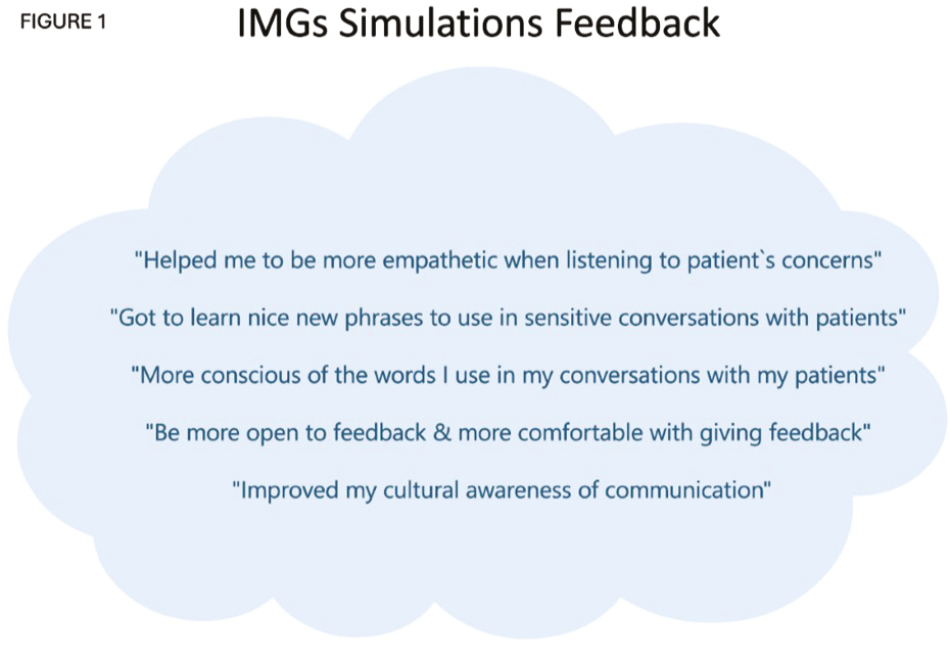
The UK medical workforce has seen a significant increase in international medical graduates (IMGs) in recent years, with a surge of 121% between 2017 and 2021, making up 50% of the new starters in the workforce in 2021, with the majority (84%) originating from South Asia, the Middle East, and Africa [1]. Despite evidence of proficiency in English, IMGs face challenges in effective communication due to differences in culture, dialect and idioms [2]. This study aimed to assess whether simulations (SIMs) focused on difficult conversations could enhance IMGs’ confidence and ability to communicate professionally in English.
Scenarios on safeguarding adults and vulnerable children, resuscitation status discussions, and duty of candour conversations were developed and delivered to IMGs who were new to the NHS during their Trust induction as a half-day course. Local faculty acted as patients with the aid of low fidelity manikins. One IMG led each SIM, while others observed aspects of the non-verbal and verbal communication, supported by set criteria [3]. References discussed in debriefing were sent to attendees by e-mail post course. Pre- and post-course surveys were employed via Microsoft Forms to measure changes in self-confidence and ability using 5-point Likert scales as open questions. Statistical significance was calculated using the paired samples t-test.
Majority of the IMGs (n=32) wanted to improve their communication skills (94%), management of difficult situations (88%) and understanding of the NHS (81%) prior to the course. Before the SIM, the mean confidence of the IMGs on their ability to practice was 3.87 out of 5. After the session, mean confidence rose to 4.39 out of 5 (increased by 0.52, p <.00001). In terms of strategies to raise concerns, mean confidence was 3.81 improving for 4.23 out of 5 after the session (increment of 0.43, p=0.00073). Receptiveness to feedback mean prior to the SIM was 4.13 increasing to 4.45 out of 5 after the session (gain of 0.32, p= 0.00543). IMGs reported improvement in communication skills (83%), namely in phrasing during difficult conversations (78%) as a significant learning point as better adherence to trust guidelines (62%), Figure 1-A37.


SIMs focused on non-technical skills can enhance IMGs’ confidence and ability to communicate professionally in English. To further improve confidence and ability, follow-up sessions could be offered to smaller groups, with the use of microphones to facilitate listening during SIMs.
Authors confirm that all relevant ethical standards for research conduct and dissemination have been met. The submitting author confirms that relevant ethical approval was granted, if applicable.
1. General Medical Council. The State of Medical Education and Practice in the UK: Workforce Report 2022 - Full Report [Internet]. Available from: https://www.gmc-uk.org/-/media/documents/workforce-report-2022---full-report_pdf-94540077.pdf.
2. Health Education England. Welcoming and Valuing International Medical Graduates: A guide to induction for IMGs [Internet]. Available from: https://www.e-lfh.org.uk/wp-content/uploads/2022/06/Welcoming-and-Valuing-International-Medical-Graduates-A-guide-to-induction-for-IMGs-WEB.pdf.
3. Occupational English Test. Speaking Assessment Criteria - Updated 2018 [Internet]. Available from: https://prod-wp-content.occupationalenglishtest.org/resources/uploads/2018/08/22102547/speaking-assessment-criteria-updated-2018.pdf.